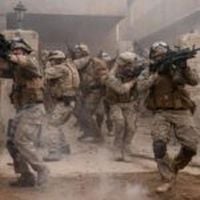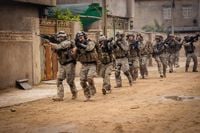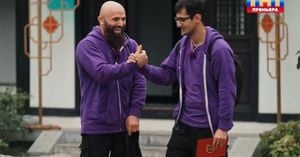In his latest film, Warfare, director Alex Garland takes viewers on a harrowing journey through the chaos of the Iraq War, specifically focusing on the real-life Battle of Ramadi. Following his previous work, Civil War, this film presents a stark and unflinching portrayal of combat, highlighting the psychological toll on young Navy SEALs as they confront the brutal realities of war.
Warfare unfolds in real-time over a tense 95-minute duration, immersing the audience in the experiences of a group of SEALs who find themselves in a dire situation during their recon mission. Set against the backdrop of 2006 Iraq, the film opens with a seemingly lighthearted scene where the SEALs gather around a laptop, enjoying the upbeat video for Eric Prydz’s dance anthem, “Call On Me.” However, this brief moment of levity quickly dissipates as viewers are thrust into the grim realities of their mission.
Garland, who co-wrote the film with military advisor Ray Mendoza, emphasizes authenticity by relying solely on the memories of the veterans who served during the mission. According to the film's opening note, “This film contains only their memories,” which sets the tone for the raw and unfiltered narrative that follows. The SEALs, portrayed by a talented cast including Kit Connor, Will Poulter, and Cosmo Jarvis, are depicted as ordinary individuals grappling with extraordinary circumstances, devoid of the typical heroics often seen in war films.
As the story progresses, the SEALs find themselves holed up in a house in Ramadi, 100 miles west of Baghdad. The film eschews conventional narrative devices, opting instead to focus on the visceral experience of warfare. There are no grand victories or heroic moments to celebrate; instead, the film highlights the cold and ruthless nature of combat. At various points, backup calls for wounded comrades are denied by higher-ups, showcasing the harsh realities faced by soldiers on the ground.
The tension in Warfare is palpable, with the camera lingering on characters as they navigate their harrowing environment. One particularly intense sequence features dialogue overshadowed by the blood-curdling screams of an injured soldier, Sam (played by Joseph Quinn), underscoring the film’s commitment to authenticity. The sound design amplifies the horror, capturing the loud bangs of explosions and the quiet internal struggles of the soldiers.
The film’s ending is equally striking, as it leaves viewers with a haunting reminder that the horrors depicted are not isolated incidents but part of a continuous cycle of violence in Iraq and beyond. As the SEALs prepare to embark on their next mission, the audience is left to grapple with the implications of their experiences and the notion that such trauma will be repeated.
Garland’s approach challenges traditional war film tropes, presenting a narrative that refuses to offer tidy resolutions or moral clarity. Instead, Warfare serves as a powerful reminder of the human cost of war, compelling viewers to reflect on the complexities of military engagement and the psychological scars borne by those who serve.
The film’s technical execution is noteworthy, with production design that brings the streets of Ramadi to life, constructed on a disused airfield in southeast England. Garland’s decision to forego a traditional soundtrack, aside from the opening scene, enhances the film's immersive quality, allowing the audience to experience the stark contrasts of silence and chaos that characterize warfare.
In the broader context of war cinema, Warfare stands alongside other impactful films that interrogate the ethics of conflict. For instance, Clint Eastwood’s American Sniper (2014) similarly explores the psychological toll of war through the story of Chris Kyle, a skilled sniper whose experiences leave lasting scars. Likewise, Kathryn Bigelow’s The Hurt Locker (2008) and Zero Dark Thirty (2012) delve into the complexities of military operations and the moral ambiguities that accompany them.
Other notable films that resonate with Warfare include Oliver Stone’s Platoon (1986), which critiques American involvement in the Vietnam War, and Edward Berger’s All Quiet on the Western Front (2022), a modern retelling of the classic anti-war narrative that highlights the futility of conflict. Each of these films, like Warfare, challenges audiences to confront the harsh realities of war rather than glorifying it.
Despite its brutal depiction of violence, Warfare is not without moments of humanity. The camaraderie among the SEALs, forged through their shared experiences, adds depth to the narrative. The cast underwent a rigorous bootcamp to prepare for their roles, with real veterans present on set to lend authenticity to their performances. This commitment to realism is evident in the portrayal of characters who, while flawed, are relatable in their struggles and fears.
Ultimately, Warfare is a film that demands introspection from its viewers. It challenges the conventions of the war movie genre, offering a stark portrayal of the human experience in combat. As the credits roll, audiences are left to ponder the lingering effects of war and the stories that remain untold. In a world where the realities of conflict are often sanitized or romanticized, Garland’s film serves as a poignant reminder of the true cost of war and the enduring impact it has on those who survive.






